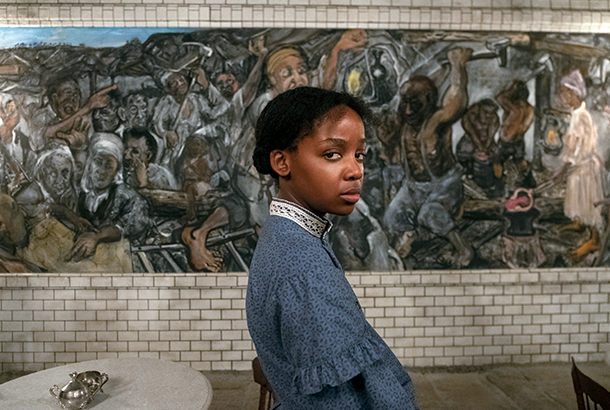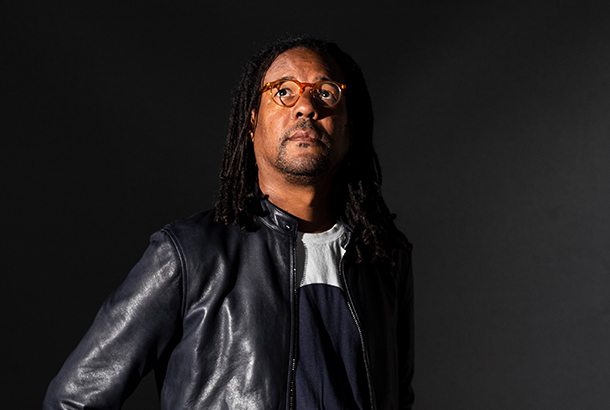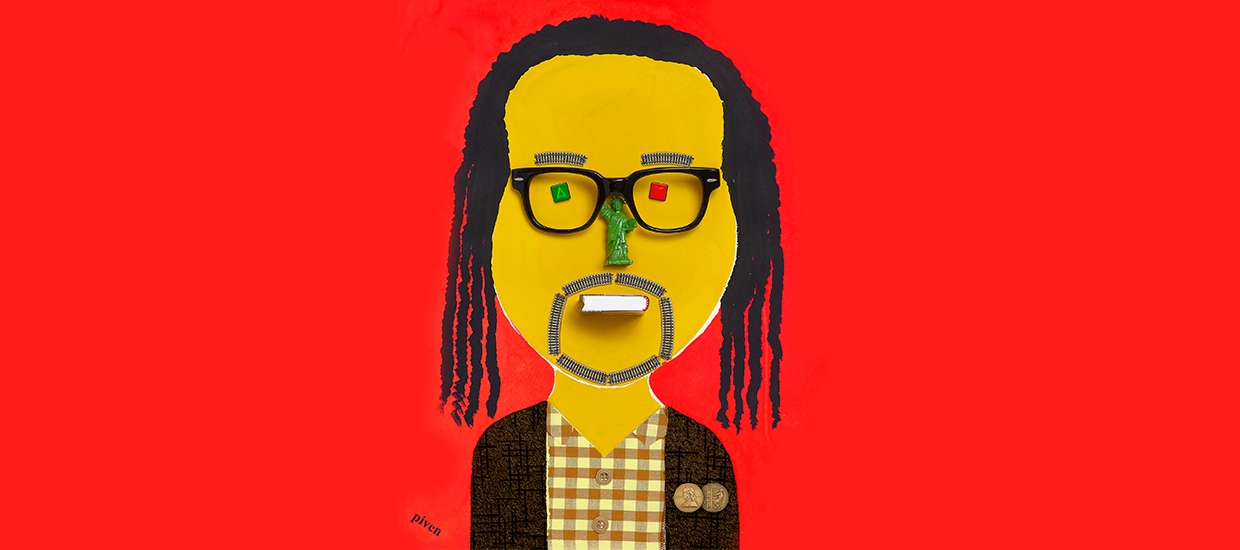Twenty-two years ago, Colson Whitehead published his first book—The Intuitionist, a sci-fi/gumshoe mashup about warring factions of elevator inspectors that allegorized race relations in America—and instantly cemented his position as one of America’s most exciting and important voices. Since then, his oeuvre has spun through a wide variety of genres, from novels that riff on folk tales (2001’s John Henry Days) and the zombie apocalypse (2011’s Zone One) to a non-fiction account of playing in the World Series of Poker (2014’s The Noble Hustle). His mainstream breakthrough came in 2016 with The Underground Railroad, a novel that mixes historical fiction and magical realism to tell the story of Cora, a teenage girl who escapes slavery in antebellum Georgia via the title route, which appears as an actual subterranean train. It won both the National Book Award and the Pulitzer Prize for Fiction, and White-head almost immediately followed that up with a second Pulitzer—for the 2019 novel The Nickel Boys, about an abusive real-life Jim Crow–era reform school—which made him only the fourth author in history to bring home the prize twice.

This month, The Underground Railroad gets the Hollywood treatment, with a 10-part Amazon Prime series directed by Barry Jenkins (Moonlight). “So many things can go wrong from optioning a book, so I try not to think about it, as a survival mechanism,” says Whitehead, calling from his home in Sag Harbor, New York. “But I felt that the book was in good hands all along.”
Congratulations on seeing your work appear on the screen. How closely did you work with Barry Jenkins on the adaptation of The Underground Railroad?
I talked to him about a month before Moonlight came out. He was interested, so they sent me a screener of Moonlight, and of course it’s a beautiful film, and after talking with him I happily gave him permission. Nothing happened contract-wise until he got the Oscar, and then suddenly a week later everything came through [laughs]. But I didn’t work on it. I had other stuff I wanted to work on, like The Nickel Boys, and I wouldn’t have written that if I had worked on the show. So we had three or four conversations, just sort of ran through ideas about how to work the adaptation. Everything he wanted to change made total sense.
Have you watched the series yet?
I finally saw it in February, and it’s just a remarkable piece of work. It’s very moving. Even as someone who wrote the book, it’s surprising. I didn’t know where it was going. Barry directed all 10 episodes, and it’s a huge feat, so I’m really in awe of him and grateful that he got the book and respected it and improved upon it where it could be improved. I loved the experience all along, and I can’t wait for people to see it.
Did you visit the set during production?
It was actually the last thing I did before lockdown. The last week of February, my wife and I went down. It was like an hour outside of Atlanta, a town I never heard of, but there was a big soundstage where they built various sets—the underground tunnel, the cabin in North Carolina, one of the saloons—and the scale was really staggering in terms of the huge cast and all the people working on it: the modelmakers, the art direction, the costume design. It was a really cool two days. And then, of course, we were locked down after that for a year [laughs].
Was it cool to see something from your imagination be enacted, or was it difficult because of the subject matter?
Actually going down to the set, it became real in a sudden and immediate fashion. I remember writing, describing a buggy, in my apartment six years ago, and someone had made the buggy. They looked at diagrams and actually figured out the physics of how it worked in a way that’s much more involved than me just saying, “It’s an 1850s wagon” [laughs]. They really did the research and made all these things solid and real. And then in the book I refer to somebody as “the carpenter’s son”; I don’t name them. You can’t really do that in a script, so I would meet people, and they’d be like, “Here’s Anthony,” and I’d be like, “Who the hell is Anthony?” Because they had to flesh out these minor characters.
This is your first book to be adapted for the screen, right?
It is. The Intuitionist was optioned maybe 20 years ago, and nothing happened. This is the first thing that’s come out.
That surprises me, because your books have always struck me as being quite cinematic.
Yeah, well, there’s a lot of Black people in them, and Hollywood’s pretty racist. Things have changed the last couple of years, so Sag Harbor and Zone One are both optioned now, and Nickel Boys. That’s a reflection of what you can do on TV now, and also this new generation of people who are raised on Spike Lee and various influences now making their own movies.

Speaking of things changing in the last couple of years, the country has recently begun to reckon, at least a little bit, with the horrors of its past. How do you square your position as an artist within that moment?
I mean, I don’t. I just write my books, and people come to them or they don’t. They deal with race, or they don’t. I’m glad that Nickel Boys and Underground Railroad are being read by high school students, and giving more of an idea of what slavery meant, because slavery is taught so poorly, but it’s not my intent to educate. And we can call it a reckoning, and definitely the protests last summer were long-lived and huge, but any advancements we make in terms of legislation and oversight of police brutality can be undone by a judge on the Supreme Court, in the same way that the Voting Rights Act was gutted a couple of years ago. So, everything is so tenuous. You have to guard it and protect it, because it can disappear very quickly.
The Underground Railroad takes place before the Civil War, and The Nickel Boys is set mostly in 1960s Jim Crow Florida. How did you do the research for the books?
Underground Railroad, it was going back to slave narratives. The Works Project Administration during the 1930s hired writers to talk to former enslaved people to get their life stories, and there’s a lot of stuff that wouldn’t go into a history book—I really got the language of the place, and that’s very grounding. With The Nickel Boys, there are survivor websites where they talk about their life there. There’s a lot of journalism about the history of the school, and while there would be an investigation [of atrocities] every 15 years, people would go to the Christmas Festival that I write about, and there’s tons of photographs over the decades, so I can see the place, even if I never went there.
The Nickel Boys is written in a straightforward, realistic style, whereas in The Underground Railroad you create these horrifying, imaginative set pieces that are more like logical extensions of real events.
Yeah, that’s definitely the intent, blowing up different incidents to their logical conclusion. The sort of World War II Nazi imagery in the North Carolina section is there because the Nazis took 19th-century scientific racism to its logical extreme, with a mass genocide, and all the methods of control under Jim Crow became enacted in a more full way in Nazi Germany. Those episodes take smaller moments in our history and blow them up and slow them down so we can consider them in a different way.
You play with genre a lot in your work. Do you start a book knowing that it’s going to be in a particular genre, or does that develop more organically?
It starts that way. I had a dream that was sort of the premise of Zone One, so it’s immediately a horror novel. Making the Underground Railroad into a literal train [that runs for] thousands of miles beneath the earth means that it’s fantastic from the very moment. And then trying to figure out how to write about the Dozier School [in The Nickel Boys], there’s really no need for a fantastic apparatus—it’s these two boys, it’s gonna be short—so the structure comes pretty quickly once I have that one-sentence description or idea.
Can you give me a little preview of your next novel, Harlem Shuffle, which is due out in September?
Yeah, it’s a crime novel set in the ’60s. I was thinking a couple of years ago about how I love heist movies. Things always go wrong, and they’ll get the million dollars in bearer bonds and then take them to the fence, and the fence will be like, “I’ll give you 10 cents on the dollar.” I’m like “No! That totally sucks!” I decided I hate that guy so much, I’ll write a book about a fence, so it’s about a small-time fence in Harlem. I wanted it to be lo-fi, and I ended up in the ’60s in New York, doing research about my hometown just before I was born.
Harlem Shuffle certainly has a lot to live up to, considering that your last two novels won Pulitzers. How different was your reaction to the news of the first prize versus the second one?
The first one, I was in a good mood for a whole year. There’s a long line at the supermarket, I’m like, “Just chill. It’s all good. You’ll get to the cashier.” And then, with the second, there was a pandemic, and a thousand people were dying every day. I was able to savor it but also turn very quickly back to, “Is the family safe?” And, “How’s it all gonna turn out?” The world is different in those two periods.
Your kids are 16 and 7 years old. How did they react to you getting those big awards?
My daughter’s older now, so she understands a little more. My son’s just sort of happy—I dedicated Harlem Shuffle to him, and I had to explain what a dedication is [laughs].
Next Up: Filmmaker Lee Daniels on The United States vs. Billie Holiday
